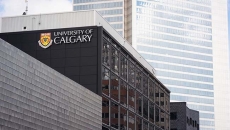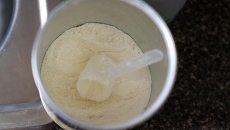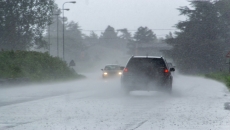OTTAWA - The federal government is banning companies from importing or making plastic bags and takeout containers by the end of this year, from selling them by the end of next year and from exporting them by the end of 2025.
The move will also affect single-use plastic straws, stir sticks, cutlery and six-pack rings used to hold cans and bottles together.
"Our government is all-in when it comes to reducing plastic pollution," Environment Minister Steven Guilbeault said Monday at a news conference on a St. Lawrence River beach in Quebec City.
Here’s the plan 👇
— Steven Guilbeault (@s_guilbeault) June 20, 2022
✅ 2022: ban on the manufacture and import of these single use plastics
✅ 2023: ban on the sale
✅ 2025: ban on the export
Together these actions will eliminate more than 1.3 MILLION tonnes of plastic waste. pic.twitter.com/9uMFdM5rVZ
Today we published final regulations to prohibit single-use plastics including:
— Karina Gould (@karinagould) June 20, 2022
✔️checkout bags
✔️cutlery
✔️hard-to-recycle takeout containers
✔️ring carriers
✔️stir sticks
✔️straws
➡️ https://t.co/1gGByvfd7e pic.twitter.com/ozxep2J7RZ
The Liberal government is targeting 2030 to eliminate all plastic waste from ending up in landfills or as litter on beaches, in rivers, wetlands and forests.
Federal data show in 2019, 15.5 billion plastic grocery bags, 4.5 billion pieces of plastic cutlery, three billion stir sticks, 5.8 billion straws, 183 million six-pack rings and 805 million takeout containers were sold in Canada.
Bags, takeout containers and straws are among the top 10 items most commonly found during shoreline and beach cleanups in Canada, along with bottles, bottle caps, coffee cups and cigarette butts.
A 2019 Deloitte study found less than one-tenth of the plastic waste Canadians produce is recycled. That meant 3.3 million tonnes of plastic was thrown out annually, almost half of it plastic packaging.
Sarah King, head of the oceans and plastics campaign for Greenpeace Canada, said banning the six items is a step forward but disagrees it's a sign Canada is all-in on plastic waste as Guilbeault claimed.
King said the six items on the list make up only about five per cent of the plastic waste Canada generated in 2019.
"It's a drop in the bucket," she said. "Until the government gets serious about overall reductions of plastic production we're not going to see the impact we need to see in the environment or in our waste streams."
King said recycling is not going to solve the problem, and the only way to end plastic waste is to stop producing most plastic.
France, which banned most of the items on Canada's list last year, began phasing in a ban on plastic packaging for more than 30 fruits and vegetables this year. It is also in the process of banning plastic wrap used on newspapers, non-biodegradable plastic in tea bags and the free plastic toys handed out to kids with fast food meals.
Guilbeault acknowledged Canada is not first in banning plastics but insists it is among the leaders. He also said there may be additional items added to the list but overall, he said, "I don't think we can ban our way out of plastic pollution."
"Banning certain items is certainly part of the solution but regulating to ensure that companies who produce plastics use more and more recycled plastic as part of your content is also part of the solution," he said.
The Deloitte report found part of the problem is the limited demand for recycled plastic. Canada intends to enact standards to force companies to use recycled plastic, in a bid to increase recycling.
"We have not closed the door to banning certain other single-use plastics." Guilbeault said. "We're starting with these ones because based on the data we have, these are the most harmful plastic substances, but it may be the case that we decide in the in the near future to ban some others."
The final regulations published Monday don't rule out some plastic alternatives to the banned items. Some beverage makers, for example, have already replaced six-pack rings with shrink wrap, which is not affected by Monday's announcement.
Olivier Bourbeau, vice-president of federal affairs at Restaurants Canada, said the government needs to do more to ensure alternatives to the banned items are readily available.
Bourbeau said there are supply chain issues at play, noting one restaurant chain with dozens of restaurants in Ontario and Quebec is only receiving half of its orders for non-plastic takeout containers, and those containers can't be branded with the restaurant's logo.
"Nobody knew the supply would be that problematic," he said.
He said the government needs to work with suppliers to make sure production can meet the pending demand.
The plan to ban exports of the six items is a change from December, when the draft regulations were published. Several environment groups were dismayed that Canada's initial plan was to ban the items at home but continue to ship them abroad.
The ban itself was expected last year, after Prime Minister Justin Trudeau first floated the idea in June 2019. But COVID-19 delayed the scientific assessment that was needed.
Six months after that assessment, which was finalized in October 2021, the federal government listed plastics as toxic under the Canadian Environmental Protection Act.
A consortium of plastics producers is suing the government over the toxic designation in a case expected to be heard later this year. The Canadian Press has reached out to that group for reaction but has not yet received a reply.
Newfoundland and Labrador, Prince Edward Island and Nova Scotia have already taken their own action against plastic bags, as have some cities including Regina, Victoria and Montreal.
Some retailers also moved faster than the government, with Sobeys eliminating single-use plastic bags at its checkout counters in 2020, and Walmart following suit this past April. Loblaws announced Monday morning it will ban bags by spring 2023.
Many fast food outlets replaced plastic straws with paper versions over the last several years as well.
Photo courtesy of IStock.






